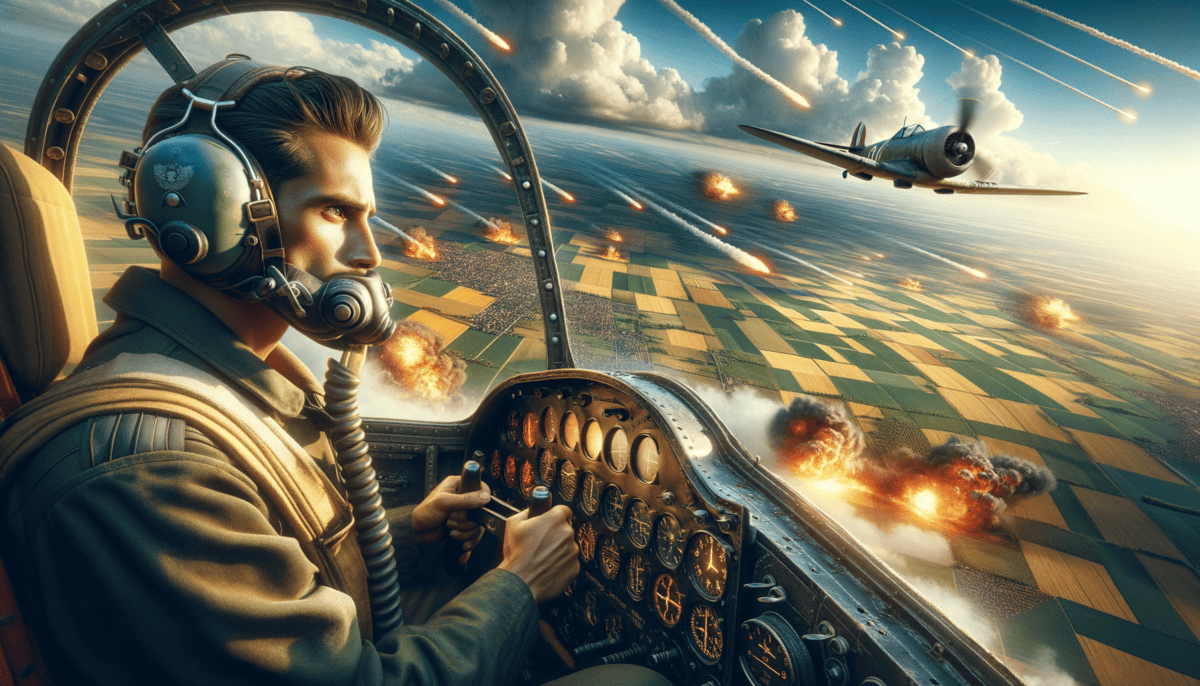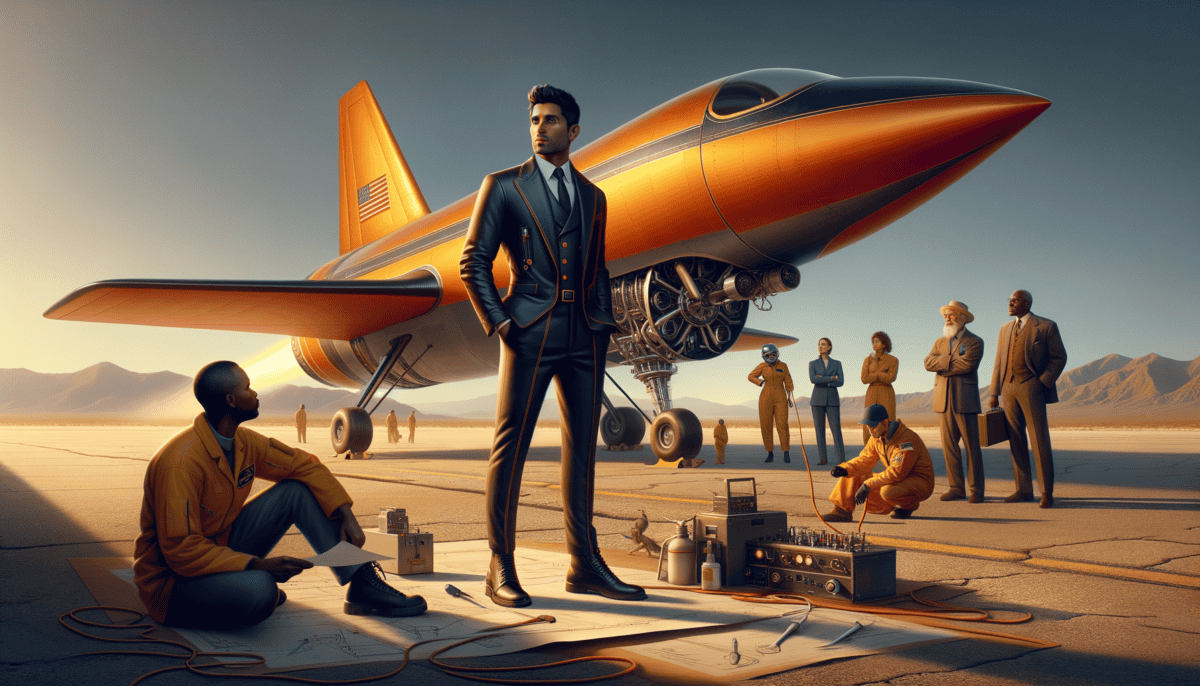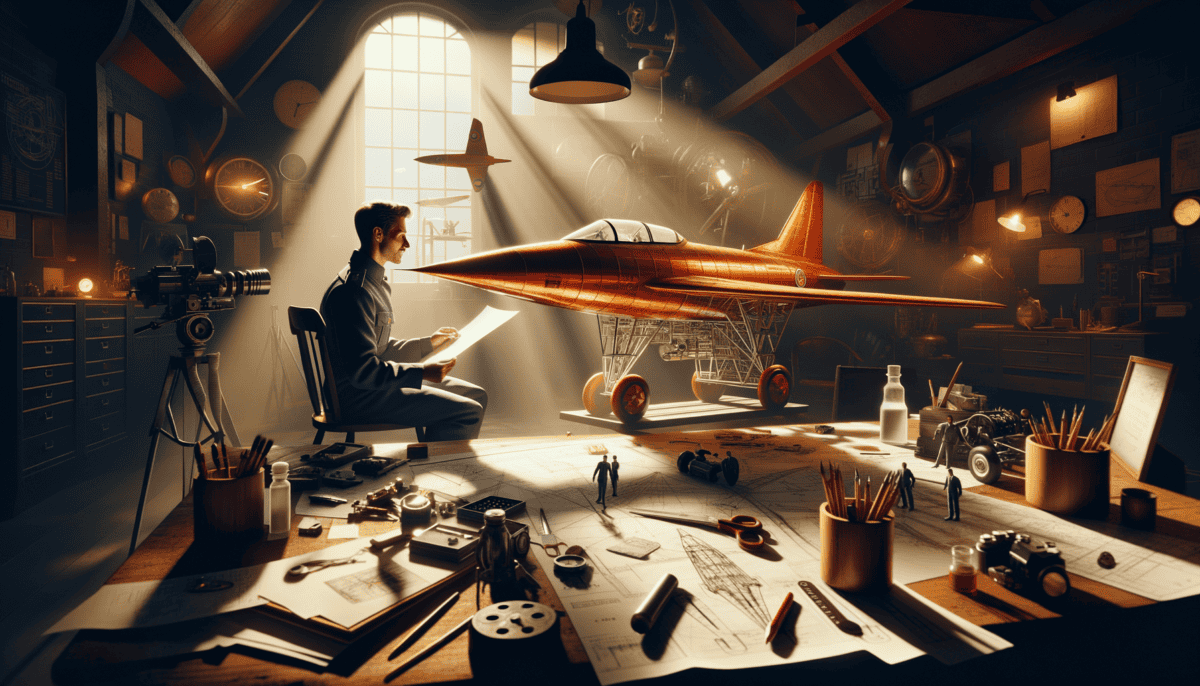Small Town Dreams
The morning sun peeked through the misty hills of Hamlin, West Virginia. Young Chuck Yeager sat on his front porch, watching planes fly high above his small town. It was 1923, and the world was full of wonder for the seven-year-old boy.
"Mama!" Chuck called out excitedly. "Look at that airplane up there!"
His mother smiled warmly. "You sure do love those flying machines, don't you, Chuck?"
Chuck spent his days exploring the woods near his house. He learned to hunt with his dad and could spot a squirrel from far away. These skills would help him later as a pilot, though he didn't know it yet.
"Son," his father said one evening while cleaning his hunting rifle, "having good eyes and steady hands is important. Keep practicing."
Life was simple in Hamlin during the 1920s. Chuck and his siblings helped with chores on their small farm. They didn't have fancy toys, but they had each other and lots of space to play.
First Signs of Flying Dreams
One special day, when Chuck was 12, something amazing happened. A small plane landed in a field near his house. The pilot let the local kids come look at it up close.
"Wow!" Chuck whispered, touching the cool metal of the wing. "This is the most beautiful thing I've ever seen!"
The pilot noticed Chuck's excitement. "You like planes, kid?"
"Yes, sir! More than anything!"
"Well," the pilot winked, "maybe you'll fly one yourself someday."
As Chuck grew older, he worked hard in school, especially in math and science. He joined the Boy Scouts and learned about maps and directions. These were all things that would help him become a pilot, though he didn't realize it then.
Growing Up Strong
Life wasn't always easy in West Virginia during the 1930s. Many families didn't have much money. But Chuck's family taught him important things:
• Never give up when things get hard
• Work hard for what you want
• Be brave and try new things
• Help others when you can
• Always tell the truth
Chuck fixed cars with his dad at their gas station. He learned how engines worked. He got his hands dirty and wasn't afraid of hard work.
"If you understand how things work," his father told him, "you can fix anything."
These early lessons would be very important when Chuck started working with airplanes later in his life.
Every time an airplane flew over Hamlin, Chuck would stop what he was doing and watch. His friends sometimes teased him about it.
"Chuck's got his head in the clouds again!" they'd laugh.
But Chuck didn't mind. He knew what he wanted to do with his life. He wanted to fly.
– Woke up early to help with farm chores
– Went to school in a one-room schoolhouse
– Worked at his dad’s gas station after school
– Watched the sky for airplanes
– Dreamed about flying
One night, as Chuck sat on the porch looking at the stars, his mother joined him.
"What are you thinking about, Chuck?"
"I'm going to be up there someday, Mama. I'm going to fly airplanes."
She squeezed his shoulder gently. "I believe you will, son. I believe you will."
The stars twinkled above them, seeming to wink at the young boy who dreamed of touching the sky. Little did anyone know that this small-town boy would not only learn to fly but would one day do something that no one had ever done before.
“Dreams are like stars,” Chuck’s teacher once told him. “You might not be able to touch them, but if you follow them, they can take you to amazing places.”
Chuck held onto that thought as he watched another plane disappear into the sunset. His journey was just beginning, and the sky was calling his name.
Wings of War
The year was 1941. Chuck Yeager, now a young man of 18, stood tall in his new military uniform. The small-town boy from Hamlin had joined the U.S. Army Air Forces as an aircraft mechanic. ✈️
“Hey, Yeager!” called out his sergeant one day. “How’d you like to be a pilot instead of fixing planes?”
Chuck’s heart jumped. “Yes, sir! More than anything, sir!”
The Flying Sergeant Program was looking for young men who wanted to become pilots. Chuck signed up right away.
Learning to Fly
Training was hard. Chuck had to learn many new things:
• How to fly in bad weather
• How to read special maps
• What to do if something went wrong
• How to land safely
• How to work with other pilots
But Chuck loved every minute of it. His hunting skills from back home helped him see things far away. His time fixing cars helped him understand how planes worked.
“Flying is a lot like hunting,” Chuck told his friends. “You have to stay calm and focus on your target.”
Into Battle
In 1943, Chuck flew his first mission over Europe during World War II. He painted “Glamorous Glen” on his plane, named after his girlfriend (and future wife) Glennis. ❤️
One day, something scary happened. Chuck was flying over Germany when enemy planes attacked. His plane was hit!
“Mayday! Mayday!” Chuck called into his radio. But he stayed calm, just like his father had taught him.
He managed to jump out of his plane with his parachute. French helpers found him and kept him safe until he could return to his base.
Becoming an Ace
Chuck didn’t let this stop him. He went back to flying as soon as he could. He shot down five enemy planes in one day! This made him an “Ace” pilot.
Chuck's friends weren't surprised. They knew he never gave up, no matter what.
– Flew 64 missions
– Shot down 13 enemy planes
– Never lost a plane he was protecting
– Known for being brave and skilled
– Helped train other pilots
“What makes you such a good pilot?” a reporter asked him.
Chuck smiled. “I just love flying. And I never forget what my dad taught me – understand how things work, and you can handle anything.”
A New Challenge
After the war ended in 1945, Chuck had a choice. He could go home to West Virginia or stay in the Air Force. He chose to stay.
“There’s still more flying to do,” he told his commanders.
They had a special job in mind for him. They needed pilots to test new kinds of planes – faster planes than anyone had ever flown before.
“Are you interested?” they asked.
Chuck’s eyes lit up. “When do I start?”
The war had changed Chuck. He wasn’t just the small-town boy from Hamlin anymore. He was one of the best pilots in the world. And soon, he would face his biggest challenge yet – flying faster than anyone had ever flown before.
As he looked at the new experimental planes, Chuck remembered watching airplanes from his front porch in Hamlin. Now he was doing more than just watching – he was making history.
The Test Pilot’s Challenge
The year was 1945. Chuck Yeager walked across the dusty airfield at Muroc Army Air Field in California. The war was over, but Chuck’s biggest adventure was about to begin.
“This is going to be different from anything you’ve ever flown,” Colonel Albert Boyd told Chuck. He pointed to a strange-looking plane with short, stubby wings.
“I’m ready, sir,” Chuck said with a confident smile. ️
Learning New Things
Chuck had to learn all about these special test planes. They were called experimental aircraft. They looked different from regular planes:
• They had rocket engines instead of regular engines
• Their wings were very short and thin
• They were shaped like bullets
• They could fly much faster than normal planes
• They were very dangerous to fly
Many pilots were scared to fly these new planes. But not Chuck. He remembered what his dad always said: “Take things apart, learn how they work, and you won’t be afraid of them.”
“The more I learn about these planes,” Chuck told his wife Glennis, “the more excited I get about flying them!”
The Special Plane
One day, Chuck saw a plane that looked like nothing he’d ever seen before. It was bright orange and shaped like a bullet. Its name was the Bell X-1.
“Want to give it a try?” Colonel Boyd asked.
Chuck looked at the plane carefully. “What’s the catch?”
“Well,” said the Colonel, “nobody knows what will happen when a plane goes that fast. It might break apart in the air.”
Getting Ready
Chuck studied everything about the Bell X-1. He learned about sonic booms and shock waves. He talked to scientists and engineers.
The more Chuck learned, the more he believed he could fly the X-1 safely.
– Learned about sound waves
– Studied rocket engines
– Practiced in simulators
– Worked with scientists
– Tested safety equipment
Two days before his first test flight, Chuck had a little accident. He fell off a horse and broke two ribs!
“Should we delay the flight?” the doctors asked.
Chuck shook his head. “No way. I’m flying that plane.”
The Big Decision
Chuck knew the flight would be dangerous. But he also knew he was the right pilot for the job.
“Why do you want to do this?” Glennis asked him one night.
“Because it needs to be done,” Chuck answered. “And I believe I can do it safely.”
The night before the first test, Chuck looked up at the stars. He thought about his journey from fixing planes to flying them in the war. Now he was about to try something no one had ever done before.
He touched his sore ribs and smiled. Tomorrow would be a big day. The sound barrier was waiting to be broken, and Chuck Yeager was ready to try. ⭐
Preparing for the Impossible
The morning air was crisp at Muroc Army Air Field. Chuck Yeager stood next to the bright orange Bell X-1, trying not to show how much his broken ribs hurt.
“Ready for the pre-flight check?” asked Jack Ridley, Chuck’s friend and engineer.
“You bet!” Chuck smiled, even though moving hurt his ribs. He had a secret – he could only close the plane’s door using a broom handle because of his injury!
Getting the Plane Ready
The team had a special way to get the X-1 into the air:
• Then the B-29 carried the X-1 high into the sky
• Chuck would climb into the X-1 during flight
• The X-1 would drop from the B-29 like a baby bird leaving its nest
• Then the rocket engines would start!
“It’s like a puzzle where every piece must fit perfectly,” Jack explained.
Special Problems to Solve
The team faced many challenges:
“The controls might stop working at high speeds,” warned one scientist.
“The plane might shake apart,” said another.
“The fuel might run out too fast,” worried a third.
But Chuck and Jack had a plan for everything. They worked day and night to solve each problem.
– Check everything twice
– Have backup plans
– Listen to the plane
– Stay calm
– Trust your training
The Special Suit
Chuck had to wear a special suit to fly the X-1. It looked like something from a space movie!
“This suit will keep you safe if something goes wrong,” explained the suit technician.
Chuck practiced moving in the suit until it felt normal. He needed to be able to reach all the controls easily.
Practice Makes Perfect
The team did twelve practice flights before trying to break the sound barrier.
“Each flight teaches us something new,” Chuck told reporters. He went a little faster each time, learning how the plane behaved.
The Night Before
The evening before the big flight, Chuck sat with his wife Glennis.
“Are you scared?” she asked.
“Not scared,” Chuck replied. “But I sure am excited. We’ve done everything possible to make this work.”
Jack Ridley came by with last-minute calculations. “The weather looks perfect for tomorrow,” he said. “Everything’s ready.”
Morning of Destiny
As the sun rose, Chuck looked at the X-1 one more time. His broken ribs still hurt, but he wasn’t going to let that stop him.
“Time to suit up,” called Jack.
Chuck nodded. They had planned for everything they could think of. Now it was time to try something no one had ever done before.
The X-1’s bright orange paint glowed in the morning sun. Soon, Chuck would find out if a plane could really fly faster than sound. ✨
The Moment of Truth
The sun was barely peeking over the desert horizon when Chuck Yeager climbed into the B-29 bomber. His heart was racing with excitement. Today was the day!
“Ready, Chuck?” asked Bob Hoover, his backup pilot.
“Ready as I’ll ever be!” Chuck grinned, hiding the pain in his ribs.
Up in the Sky
The B-29 carried the bright orange X-1 high into the morning sky. At 23,000 feet, it was time for Chuck to climb into the X-1. The air was thin and cold. ❄️
“Careful with that door,” Jack Ridley called out as Chuck used his secret broom handle trick.
“Everything looks good from here,” Chuck radioed back. “The X-1 is purring like a kitten!”
The Big Drop
At 25,000 feet, Chuck heard the countdown:
The X-1 dropped away from the B-29. Chuck felt like he was riding a roller coaster!
He fired the first rocket engine. WHOOSH! The X-1 shot forward like an arrow.
Racing with Sound
The plane climbed higher and faster. Chuck watched his speed meter:
– 0.85 Mach (85% of sound speed)
– 0.90 Mach (getting closer!)
– 0.95 Mach (almost there!)
The plane started to shake. Warning lights blinked. But Chuck stayed calm, just like in practice.
Breaking Through
Suddenly, everything went quiet. The shaking stopped. Chuck looked at his instruments…
Mach 1.07! He was flying faster than sound!
“Say, that wasn’t so bad,” Chuck said into his radio, cool as could be. On the ground, the team heard a loud BOOM – the first sonic boom in history!
Coming Back to Earth
When the rocket fuel ran out, Chuck glided the X-1 back to Earth. He could see the whole desert below him.
The landing was smooth as silk. As Chuck climbed out, Jack ran up with a big smile.
“You did it, Chuck! You really did it!”
A Secret Success
Even though Chuck had done something amazing, it was kept secret at first. But he didn’t mind – he knew what he had done.
That night, Chuck wrote in his diary: “The X-1 worked perfectly. Now we know humans can fly faster than sound!”
He looked up at the stars, thinking about how far he’d come from his small town in West Virginia. And he wondered what other amazing things pilots would do in the future. ✨
Reaching for the Stars
Chuck Yeager’s amazing flight changed flying forever! After breaking the sound barrier, he kept testing new planes and pushing them faster and higher.
A Hero’s Welcome
When the news finally came out, everyone wanted to meet Chuck. He was in newspapers and on TV. But he stayed humble, just like the small-town boy he used to be.
“It wasn’t just me,” Chuck would say. “It was all the smart people who built the X-1 and helped me fly it.”
“The real trick to flying is not being afraid to learn new things,” Chuck told young pilots.
Flying into the Future
Chuck’s flight opened up a whole new world of flying! Soon, lots of planes could fly faster than sound: ✈️
– Faster fighter planes
– Speedy passenger jets
– Space rockets
– Better plane designs
Teaching Others
Chuck spent many years teaching other pilots how to fly fast planes. He loved sharing what he knew.
“Remember,” he’d tell them, “flying fast is fun, but flying smart is what keeps you safe!”
A Lasting Dream
Even when Chuck got older, he kept flying. He showed that if you work hard and believe in yourself, you can do amazing things!
The Greatest Gift
Chuck’s biggest gift to the world wasn’t just flying fast – it was showing that nothing is impossible if you try hard enough.
Today, planes fly faster than sound all the time. Astronauts zoom into space. And it all started with a brave pilot from West Virginia who wasn’t afraid to chase his dreams.
Every time we hear a sonic boom or see a jet zoom overhead, we can thank Chuck Yeager – the first person to fly faster than sound! ✨
Chuck’s story shows us that the biggest barriers we face aren’t in the sky – they’re the ones we put in our own minds. And just like Chuck, we can break through them if we believe in ourselves and never stop trying!






